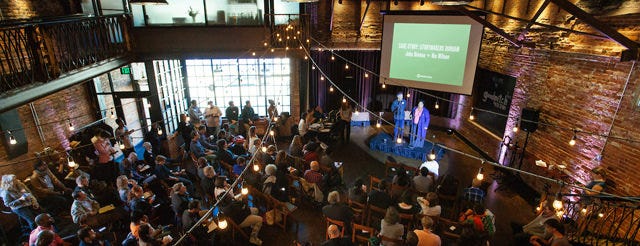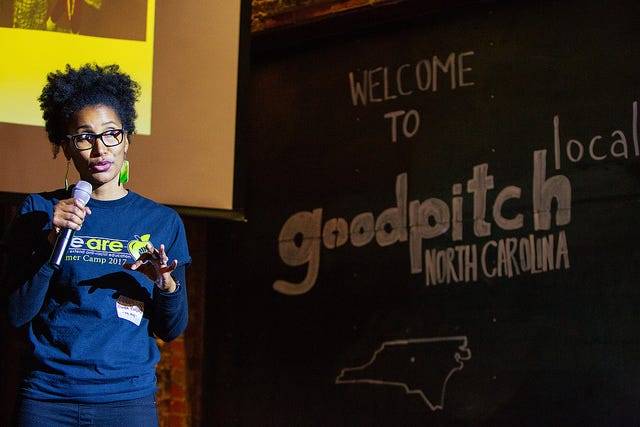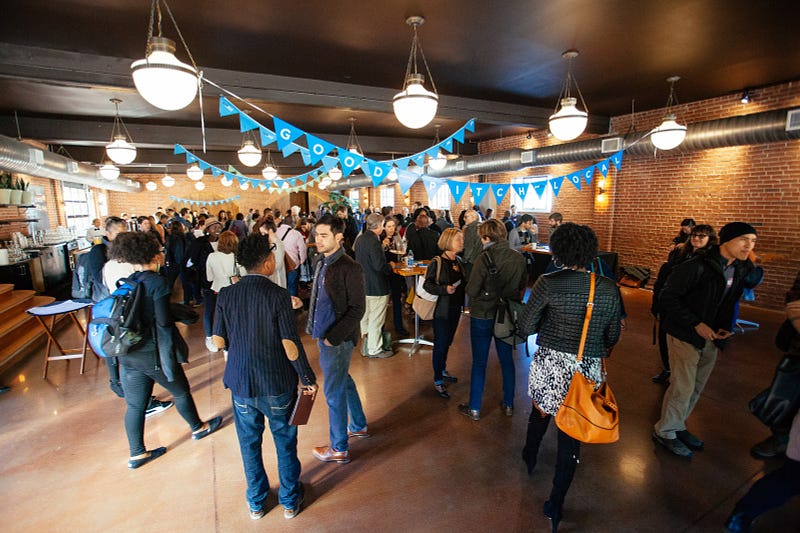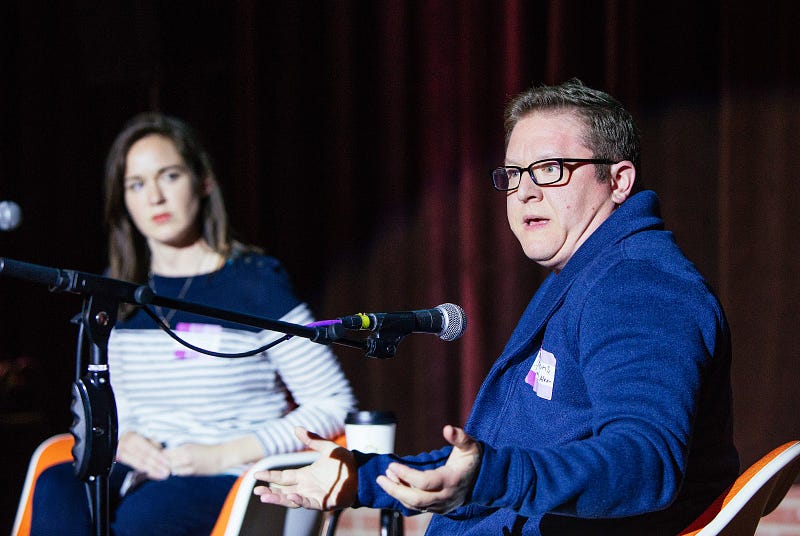
Good Pitch Goes Local
Good Pitch Local is an analog immersive storytelling experience
 A view from above, Good
Pitch-Local North Carolina, Oct. 17, 2017
A view from above, Good
Pitch-Local North Carolina, Oct. 17, 2017The year 2017 was about reinvention for BRITDOC. The organization became Doc Society in acknowledgement of its global reach, even as it pressed “pause” on the US edition of the flagship Good Pitch program that has been held in the heart of the media capital of the world for the last several years.
From a landmark event at the New York Times Center and a focus on seven or so feature documentaries, Good Pitch has gone local, expanding to more places, more pitches, and more formats, including shorter-form and multi-platform productions. Good Pitch Local (GPL) is an experiment at the nexus of independent storytelling and movement building, creating a place for highly engaged local leaders to come together in real time to talk to each other, to forge new partnerships, and to tell stories that matter in this moment, in this place.
Like Immerse, GPL is a place to explore new forms of storytelling. It’s the live event corollary an immersive, public, interactive experience. Both ask: Who are the new makers and what are the stories and screens shaping culture or challenging the status quo?
For me, having worked alongside the Good Pitch team since 2008—first at Sundance and now as a consultant—it is exciting to be at Doc Society leading this new iteration of a model that is central to the evolution of documentary making a difference.
The way in which the carefully selected audience of media makers, organizers, funders, media outlets, and film arts organizations respond to a particular pitch shapes what happens next.
At GPL the audience and participants are one. The moderators introduce up to 18 three-minute pitches plus case studies from both makers and organizers, and then turn to the audience to gather feedback: from offers of funding to creative connections, to thoughtful and critical analysis of the project and what it might mean for this community.
 Ronda Bullock of We Are
Ronda Bullock of We Are
The Pitch Evolution: From Great to Good
To understand this format, it’s worth taking a moment to review the evolution of documentary pitching forums over the last 24 years.
- 1993: The Forum at IDFA launches. Documentary filmmakers pitch to commissioning editors and media funders alongside the November festival in Amsterdam, a great new opportunity for filmmakers and commissioning editors alike.
- 1994: Hot Docs follows with a springtime forum in Toronto. Dozens more organizations launch their own pitches for local and international filmmakers.
- 2007: BRITDOC mixes it up with a pitch event in Oxford that includes partner organizations and non-media funders who can help ensure film projects achieve maximum social impact. Good Pitch is born. Ten years, 34 events, 15 countries, and 150 films later…
- 2017: The Good Pitch Local—a curated mix of media makers and change leaders pitching ideas and short-form media projects to a diverse group of potential collaborators and partners—launches in Miami, FL, and Durham, NC.
 Lots of Good Connections being in
made at the Cookery in Durham, NC.
Lots of Good Connections being in
made at the Cookery in Durham, NC.Political Context
“Local is the new global,” is the cultural corollary to the old adage “all politics is local.” They both point to the reality that change starts at the local level. And these are times in which change, and hope, are sorely needed. As one North Carolina filmmaker, Nick Norbage, noted, “If you’re discouraged by today’s political climate, go to a Good Pitch Local event and become re-inspired with the best that humanity is doing.”
The work of impact producing presents a constant dynamic tension between community engagement and issues that are playing out on the national and global level. Earlier this month, I met with community organizers in Texas. We learned that in the aftermath of Hurricane Harvey in Houston, the problem of access to affordable housing has become a crisis. While the meta issue is climate change, the immediate challenge is meeting the needs of thousands who were already living in substandard housing, and are now living in toxic homes, or are simply homeless. Now, we’ll look to invite storytellers who might work with community organizers to tell those stories. And we’re reaching out to local funders who can support the creation of projects pitched on the day.
GPL also presents a shift to short film. Why? Online viewing is the fastest growing form of media consumption, and short form is growing faster than long form. This is not about reducing our commitment to long-form documentary; to borrow from Tina Fey and the world of comedy improv, it is “yes, and.”
How can we embrace short-form, social-media-driven viewing while acknowledging an essential truth of human nature, that people have a powerful need to come together and share stories IRL? Social change requires coalition-building and strong communities, acknowledging the power of online coalitions, real life is magic.
As non-fiction storytelling and distribution platforms rapidly evolve, Doc Society and our partners in the media arts aim to help both creators and organizers adapt to ensure they create content that responds to the needs of communities and connects to audiences that can make a difference.
As with our filmmakers, we rely on local partner organizations. In Durham in mid-October we worked with Southern Documentary Fund and Working Films.
In North Carolina, the day-long affair boasted 190 attendees and an equal mix of media makers and organizations. Participants pitched 18 current and potential projects ranging from a series on the real roots of Southern cooking to a look at millennials of the moral movement, interrogating the legacy of lynching, and stories addressing immigration and land preservation. Just over $25,000 was granted in the room, and dozens of offerings included free coding, invitations to showcase creative work or speak at events, help with grant-writing, plus access to networks and talent.
One of the pitches came from Cecilia Polanco, a recent UNC graduate and the founder of “So Good Pupusas” a Salvadoran food truck that helps fund her nonprofit, which provides last-dollar scholarships for undocumented students. A filmmaker expressed interest in the story, a marketer offered her services, and someone offered to help with volunteers.
Cecilia wrote, “Good Pitch is like Shark Tank—or more of a ‘heart tank’—where people whose skills, talents, time or treasure, can be connected to create and amplify impact… the thing about Good Pitch is that it’s not a competition against other pitches, everyone can leave the room winning through the connections and support received.”
North Carolina is the birthplace of the “Forward Together Moral Movement.” Filmmakers Dara Kell and Erik Preston presented “America Will Be,” a project with the Rev. Dr. William J. Barber and the Kairos Center designed to help shift the national narrative on poverty.
 Alysse Campbell and Alex Hoplins
talk “Tea Time”
Alysse Campbell and Alex Hoplins
talk “Tea Time”While most of the projects pitched were linear non-fiction storytelling, several played with form. “Tea Time with Alex” by Alex Hopkins and Alysse Campbell, a web-series video call-in show, is a powerful and humorous response to HB2 (aka the bathroom bill), meant to educate on transgender topics with a dash of sass. Ronda Bullock from We Are (Working to Extend Anti-Racist Education) presented an opportunity for a digital developer to create a storytelling tool, aimed at young children, that helps develop a healthy racial identity while creating a sense of racial justice advocacy.
These are just a few of the projects we loved. We’ll be circling back to media projects and partners that pitched in North Carolina and earlier this year at our pilot event in Miami. Looking ahead, we will be in Dallas, Texas, on February 27th. We are working with Texas Organizing Project, Ignite Arts Dallas , EarthX, and others to identify potential participants. And we will present a media impact workshop at Austin Film Society’s Austin Public space on Sunday, February 25th.
Next up: Detroit, Michigan and more destinations in 2018 and beyond.

Immerse is an initiative of Tribeca Film Institute, MIT Open DocLab and The Fledgling Fund. Learn more about our vision for the project here.